SONIA UTS: Difference between revisions
No edit summary |
No edit summary |
||
| Line 4: | Line 4: | ||
== Design == | == Design == | ||
[[File:SONIA UTS1200 Alt.jpg|thumb| | [[File:SONIA UTS1200 Alt.jpg|thumb|240x240px|An omnidirectional SONIA UTS1200.|left]] | ||
The SONIA UTS utilizes several thin rectangular horns with a triangular side-profile made of aluminum alloy. 150 W drivers for each horn power the siren, with cube-shaped enclosures shielding each driver from the elements. The design of the horns and drivers are sourced from HÖRMANN's ECN, as its speaker design is very efficient and extremely influential as a result of the design being licensed to other manufacturers (and in some cases copied), resulting in many other sirens looking similar, if not identical to the ECN series, with the only changes being the logos on the sides of the horns. The SONIA UTS horns do not have any logo branded on them and were most likely not produced in-house. The minimum number of speakers the SONIA UTS supports is 4 (600 W), and the maximum is 16 (2400 W). The speakers attach to each other and are installed on a galvanized steel pole, allowing for a variety of configurations; in most cases, they are arranged in a way where the sound is propagated omnidirectionally, with the principle being based on gap diffraction (also called Huygens' principle). | The SONIA UTS utilizes several thin rectangular horns with a triangular side-profile made of aluminum alloy. 150 W drivers for each horn power the siren, with cube-shaped enclosures shielding each driver from the elements. The design of the horns and drivers are sourced from HÖRMANN's ECN, as its speaker design is very efficient and extremely influential as a result of the design being licensed to other manufacturers (and in some cases copied), resulting in many other sirens looking similar, if not identical to the ECN series, with the only changes being the logos on the sides of the horns. The SONIA UTS horns do not have any logo branded on them and were most likely not produced in-house. The minimum number of speakers the SONIA UTS supports is 4 (600 W), and the maximum is 16 (2400 W). The speakers attach to each other and are installed on a galvanized steel pole, allowing for a variety of configurations; in most cases, they are arranged in a way where the sound is propagated omnidirectionally, with the principle being based on gap diffraction (also called Huygens' principle). [[File:SONIA UTS controller.jpg|thumb|189x189px|The controller of a SONIA UTS600.]]The SONIA UTS sirens run on 230 V AC/12 V DC, powered by 2 40-45 Ah rechargeable lead acid batteries, and utilize a varying number of Class D amplifiers depending on the number of speakers used. Axatel's SONIA software, of which these sirens are integrated with, allows for remote activation of the sirens, the monitoring of unauthorized access to the control panel, seismic, chemical, and weather activity near each siren site, and live audio to be broadcasted through the sirens. An optional weather station able to be installed alongside a SONIA UTS unit, consisting of a temperature, wind, and humidity sensor, can provide weather forecasts viewable through the SONIA software. Each siren communicates with SONIA by either GSM mobile telephony, ethernet TCP/IP protocol networks, a dedicated telephone line, or a dedicated VHF/UHF radio frequency. The sirens can be disconnected from electricity via the software whenever necessary, and the status of a siren's power supply, drivers, amplifier, and batteries are also able to be monitored. | ||
These sirens can activate every 2 minutes for at least 10 days after disconnection from mains electricity. All of the SONIA UTS's control components are housed in a square IP55 weather-resistant enclosure (although SONIA UTS1200/2400 units have slightly longer rectangular enclosures to make up for additional equipment). The SONIA UTS's output, as rated by Axatel, is 109 to 121 dBa at 30 m (100 ft). The sirens are audible at 70 dBa for at least 5.2 km2 (2 sq mi)/1300 m (0.8 mi) to 12.6 km2 (4.8 sq mi)/2000 m (1.2 mi) and have an operating temperature range of -30°C to +75°C. | |||
Specifications for individual sirens in the SONIA UTS lineup are listed in the table below. | Specifications for individual sirens in the SONIA UTS lineup are listed in the table below. | ||
Latest revision as of 13:14, 21 December 2024
Not to be confused with the SONUS, a similar German brand of siren produced by HELIN.
| SONIA UTS | |
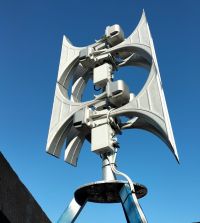 A SONIA UTS1200 unit in Sibiu, SB. | |
| Company | Axatel Service |
|---|---|
| Produced | 2004-present |
| Type | Directional/Omnidirectional Electronic |
| Sound output | 109-121 dBa @ 30 m (100 ft)
|
| Wattage | 600-2400 W |
| Voltage | 230 V AC/12 V DC |
The SONIA UTS is a range of omnidirectional/directional electronic sirens produced since 2004 by Axatel Service, an outdoor/indoor notification firm based in Romania. Working in tandem with Axatel's SONIA software, the SONIA UTS is a popular choice in Romania and competes regionally with the well-established Telegrafia PAVIAN.
Design
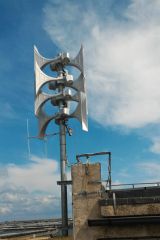
The SONIA UTS utilizes several thin rectangular horns with a triangular side-profile made of aluminum alloy. 150 W drivers for each horn power the siren, with cube-shaped enclosures shielding each driver from the elements. The design of the horns and drivers are sourced from HÖRMANN's ECN, as its speaker design is very efficient and extremely influential as a result of the design being licensed to other manufacturers (and in some cases copied), resulting in many other sirens looking similar, if not identical to the ECN series, with the only changes being the logos on the sides of the horns. The SONIA UTS horns do not have any logo branded on them and were most likely not produced in-house. The minimum number of speakers the SONIA UTS supports is 4 (600 W), and the maximum is 16 (2400 W). The speakers attach to each other and are installed on a galvanized steel pole, allowing for a variety of configurations; in most cases, they are arranged in a way where the sound is propagated omnidirectionally, with the principle being based on gap diffraction (also called Huygens' principle).
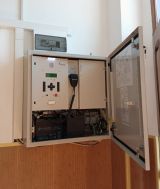
The SONIA UTS sirens run on 230 V AC/12 V DC, powered by 2 40-45 Ah rechargeable lead acid batteries, and utilize a varying number of Class D amplifiers depending on the number of speakers used. Axatel's SONIA software, of which these sirens are integrated with, allows for remote activation of the sirens, the monitoring of unauthorized access to the control panel, seismic, chemical, and weather activity near each siren site, and live audio to be broadcasted through the sirens. An optional weather station able to be installed alongside a SONIA UTS unit, consisting of a temperature, wind, and humidity sensor, can provide weather forecasts viewable through the SONIA software. Each siren communicates with SONIA by either GSM mobile telephony, ethernet TCP/IP protocol networks, a dedicated telephone line, or a dedicated VHF/UHF radio frequency. The sirens can be disconnected from electricity via the software whenever necessary, and the status of a siren's power supply, drivers, amplifier, and batteries are also able to be monitored.
These sirens can activate every 2 minutes for at least 10 days after disconnection from mains electricity. All of the SONIA UTS's control components are housed in a square IP55 weather-resistant enclosure (although SONIA UTS1200/2400 units have slightly longer rectangular enclosures to make up for additional equipment). The SONIA UTS's output, as rated by Axatel, is 109 to 121 dBa at 30 m (100 ft). The sirens are audible at 70 dBa for at least 5.2 km2 (2 sq mi)/1300 m (0.8 mi) to 12.6 km2 (4.8 sq mi)/2000 m (1.2 mi) and have an operating temperature range of -30°C to +75°C.
Specifications for individual sirens in the SONIA UTS lineup are listed in the table below.
| Model | Drivers/wattage | dBa @ 30 m (100 ft) | 70 dBa audibility range |
|---|---|---|---|
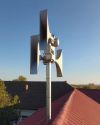 |
4 (600 W) | 109 | 5.2 km2 (2 sq mi)/1300 m (0.8 mi) |
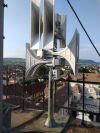 |
8 (1200 W) | 115 | 7.1 km2 (2.7 sq mi)/1500 m (0.9 mi) |
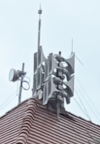 |
16 (2400 W) | 121 | 12.6 km2 (4.8 sq mi)/2000 m (1.2 mi) |